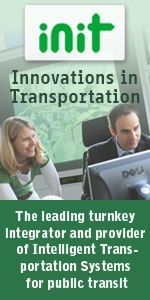

| In This Issue |
| » NEWS HEADLINES |
| » COVERAGE OF 2010 LEGISLATIVE CONFERENCE |
| » COMMENTARY |
| » TELLING OUR STORY |
| » APTA NEWS |

Check out the classifieds for job opportunities including a general manager, a director of paratransit, and a regional president with a management firm!
| COVERAGE OF 2010 LEGISLATIVE CONFERENCE |
Coalition Backs More Public Transit Investment
By JOHN R. BELL, APTA Program Manager-Communications
A panel representing the full diversity of the American transportation industry discussed the pressing need for greater federal investment in public transportation at the 2010 APTA Legislative Conference in Washington, DC.
 Peter J. (Jack) Basso, director of program, finance, and management for the American Association of State Highway and Transportation Officials (AASHTO), opened the March 15 session titled “Expanding the Transit Coalition: Partners in the Authorization Debate.” He lamented the near-insolvency of the federal Highway Trust Fund and noted the precipitous decline in the buying power of the gasoline tax, caused by inflation, since its last increase in 1993.
Peter J. (Jack) Basso, director of program, finance, and management for the American Association of State Highway and Transportation Officials (AASHTO), opened the March 15 session titled “Expanding the Transit Coalition: Partners in the Authorization Debate.” He lamented the near-insolvency of the federal Highway Trust Fund and noted the precipitous decline in the buying power of the gasoline tax, caused by inflation, since its last increase in 1993.
Basso called for a continued strong federal role in transportation funding, the elimination or stringent limitation of earmarks for transportation programs, as well as policies that support maximum flexibility for financing of transportation projects.
He likened the current era to the introduction of the Interstate Highway System: “We’re in the same position all of us were in 1955-1956—to make history.”
T. Peter Ruane, president and chief executive officer of the American Road & Transportation Builders Association (ARTBA),  also pointed to a shortfall in federal transportation investment. He said of the American Recovery and Reinvestment Act (ARRA): “Congress did the right thing; they just didn’t do enough of it.”
also pointed to a shortfall in federal transportation investment. He said of the American Recovery and Reinvestment Act (ARRA): “Congress did the right thing; they just didn’t do enough of it.”
According to Ruane, the construction industry faces 25 percent unemployment, “the highest of any sector.” Given this stark reality, he continued, the need is critical for Congress to pass full surface transportation authorization this year.
He lauded APTA as a partner in this effort, referring to the “very close, very warm, very professional relationship with APTA over the years” and recounting instances when ARTBA and APTA joined forces to oppose proposals that would have been detrimental to transportation. “You have to continue to tell your story. And you’ve done a very good job—especially in the last 10 years,” said Ruane.
 Edward Wytkind, president of AFL-CIO’s Transportation Trades Department, which represents 32 transportation unions, spoke on behalf of APTA’s labor-union allies. Public transportation is “a growth industry with unlimited potential,” Wytkind said, and the current partnership between APTA and labor “is the strongest I’ve seen,” adding: “We are fierce advocates of public transportation.” His organization also supports an authorization bill of “at least half a trillion dollars.”
Edward Wytkind, president of AFL-CIO’s Transportation Trades Department, which represents 32 transportation unions, spoke on behalf of APTA’s labor-union allies. Public transportation is “a growth industry with unlimited potential,” Wytkind said, and the current partnership between APTA and labor “is the strongest I’ve seen,” adding: “We are fierce advocates of public transportation.” His organization also supports an authorization bill of “at least half a trillion dollars.”
However, finding a politically viable source of increased funding remains a challenge for public transit advocates, Wytkind noted, because when an elected official suggests raising user fees, “there are already TV spots written for the other side,” he said, echoing Basso’s assessment. He called on advocates for public transit to find a bipartisan argument for raising those fees.
He also recommended the full use of Amtrak in the introduction of high- and higher-speed rail in America, well-funded training programs, and a reinvestment in U.S. manufacturing.
Wytkind agreed with Ruane’s assessment of ARRA as effective but limited by the amount of funding it contained—which underscores the urgency for full authorization. “We need to get something done this year,” he said.
Also on the panel was Mariia V. Zimmerman, policy director for Reconnecting America and co-chair of the APTA Land Use and Economic Development Subcommittee. She noted that the forthcoming authorization bill holds not only great challenge but also great promise. “Because nothing is probable, anything is possible,” she said. Reconnecting America also supports a bill that includes at least $500 billion.
and Economic Development Subcommittee. She noted that the forthcoming authorization bill holds not only great challenge but also great promise. “Because nothing is probable, anything is possible,” she said. Reconnecting America also supports a bill that includes at least $500 billion.
Zimmerman expressed amazement that surface transportation authorization has become a partisan issue, given that transportation and public transit are supported by business, environmental, social equity, and other advocates spanning a range of political viewpoints.
She specifically asked audience members to support the National Transportation Objectives Act (H.R. 2724, currently in committee), which lists energy security, climate change, state of good repair, and accessibility among the principles that should guide the next authorization bill; the Complete Streets Act (S. 584); the Clean Low-Emissions Affordable New Transportation Equity Act (CLEAN-TEA—H.R. 132, introduced last year); and federal support for public transit operating assistance.
“Let’s keep the pressure up,” she said.
| « Previous Article | Return to Top | Return to Main | Next Article » |
|
||||||
| AMERICAN PUBLIC TRANSPORTATION ASSOCIATION |
Telephone (202) 496-4800 • Fax (202) 496-4321
Search Back Issues
